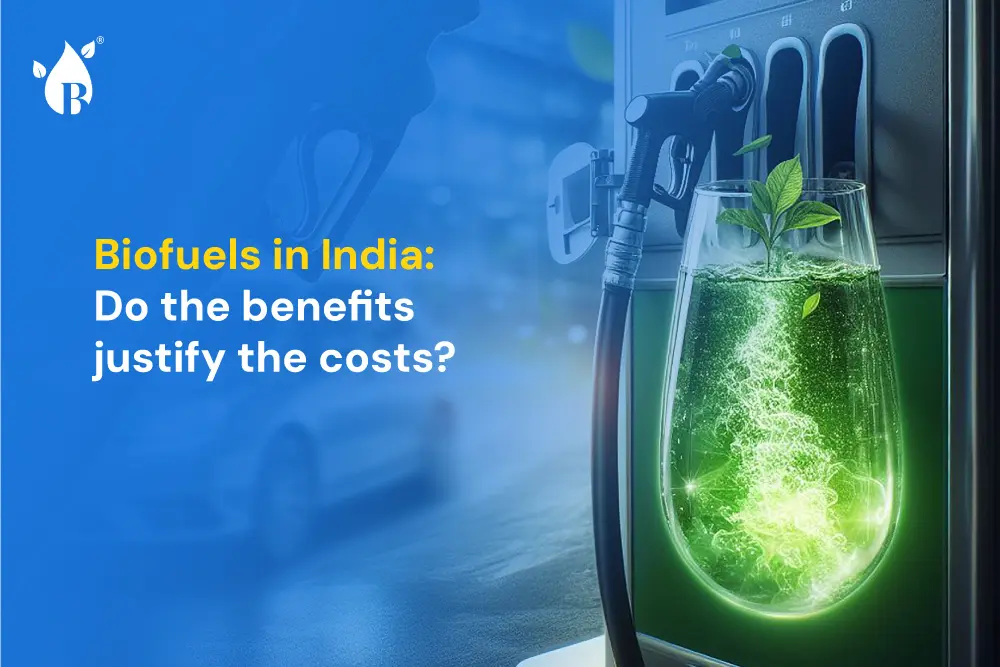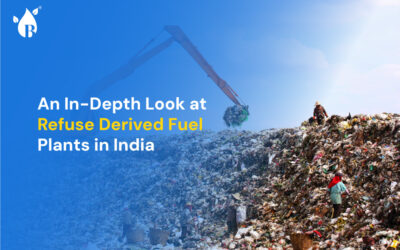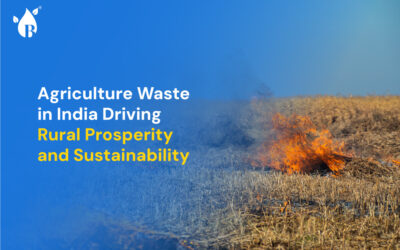
Understanding Biofuels
They can be broadly categorized into solid, liquid, and gaseous biofuels. In India, loose biomass, biomass briquettes, bioethanol, and biodiesel are the most prominent, as the government actively promotes their production and use to reduce the nation’s dependence on fossil fuels. Additionally, recent initiatives in green hydrogen are gaining traction, further contributing to the country’s renewable energy landscape.
The Benefits of Biofuels in India
Reduction in Greenhouse Gas Emissions: One of the most significant benefits of biofuels is their potential to reduce greenhouse gas (GHG) emissions. When compared to fossil fuels, biofuels produce fewer emissions during combustion, contributing to a decrease in the overall carbon footprint. This is particularly crucial for India, which is among the world’s top emitters of CO2. By adopting biofuels, India can significantly advance its commitments to international climate agreements, such as the Paris Agreement.
Energy Security: India imports nearly 85% of its crude oil, making the country highly vulnerable to global oil price fluctuations. Biofuels offer a pathway to reduce this dependency by providing an indigenous source of energy. With a consistent supply of raw materials like sugarcane, rice husks, and jatropha, India can produce biofuels locally, ensuring a stable and more predictable energy supply.
Economic Development: The biofuel industry has the potential to create numerous employment opportunities, particularly in rural areas. From farming and harvesting biofuel crops to processing and distribution, the entire value chain can contribute to rural development. This can help alleviate poverty and reduce the urban-rural divide by providing sustainable livelihoods to farmers and workers in the biofuel sector.
Waste Management: India generates millions of tons of agricultural waste annually. This waste, if not managed properly, can lead to environmental degradation through open burning or improper disposal. Biofuels offer a solution by converting agricultural residues into energy, thus addressing the dual challenges of waste management and energy production.
Promotion of Sustainable Agriculture: The cultivation of biofuel crops, such as jatropha and sweet sorghum, can promote sustainable agricultural practices. These crops often require less water and fewer chemical inputs compared to traditional food crops. Additionally, by integrating biofuel production with existing agricultural practices, farmers can diversify their income streams and reduce the financial risks associated with monoculture.
The Costs and Challenges of Biofuels in India
Competition with Food Production: One of the most significant criticisms of biofuels is the potential conflict with food production. In a country where food security is a critical concern, dedicating arable land to biofuel crops could lead to higher food prices and reduced food availability. This is particularly concerning for a nation like India, where a significant portion of the population is still undernourished.
Environmental Impact: While biofuels are often touted as an environmentally friendly alternative to fossil fuels, their production can have adverse environmental consequences. For instance, large-scale cultivation of biofuel crops can lead to deforestation, loss of biodiversity, and soil degradation. Moreover, the use of fertilizers and pesticides in biofuel crop production can contribute to water pollution and other environmental issues.
High Initial Costs: The development of a biofuel infrastructure in India requires significant investment. From setting up bio-refineries to developing efficient supply chains, the initial costs can be prohibitive. Additionally, the technology for producing advanced biofuels is still in its nascent stages, requiring further research and development before it can be commercially viable.
Efficiency and Energy Balance: The energy balance of biofuels, which is the ratio of the energy produced to the energy consumed in production, is a critical factor. In some cases, the energy input required for growing, harvesting, and processing biofuel crops can be substantial, reducing the overall efficiency of biofuels as an energy source. This raises questions about their long-term sustainability and economic viability.
Policy and Regulatory Challenges: The success of biofuels in India largely depends on robust policy frameworks and regulatory support. However, the biofuel sector has faced challenges due to inconsistent policies, lack of incentives, and bureaucratic hurdles. For biofuels to thrive, the government needs to streamline regulations, provide clear guidelines, and offer financial incentives to encourage investment in the sector.
Final Thoughts
To determine whether the benefits justify the costs, a balanced approach is essential. India must prioritize sustainable practices in biofuel production, ensuring that it does not compromise food security or environmental health. Additionally, targeted investments in technology and infrastructure, along with supportive policies, are crucial to realizing the full potential of biofuels.



